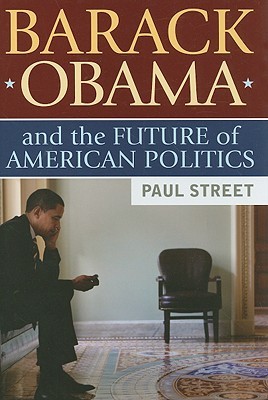

| BARACK OBAMA And the Future of American Politics Paul Street Boulder, CO: Paradigm Publishers, 2008 |
Rating: 4.5 High |
|||
| ISBN-13 978-1-59451-631-3 | ||||
| ISBN-10 1-59451-631-6 | 280pp. | HC | $23.95 | |
Paul Street has a doctorate in U.S. History from Binghamton University. From 2000 to 2005 he was Director of Research and Vice President for Research and Planning at the Chicago Urban League; now he's based in Iowa City, IA and works as an independent policy researcher, historian, and journalist.
In an interview,1 Street describes his fourth book thus:
The book is an attempt to demystify Barack Obama and understand his emergence and candidacy in the context of U.S. political culture and history. Everybody knows that the rise of Obama is loaded with relevance for American social and political history. But what is "the Obama phenomenon," exactly? Its nature and meaning remain shrouded in fantasy, wishful thinking, projected aspirations, and (on the right) preposterous neo-McCarthyite accusation. My book situates Obama firmly within the United States' longstanding corporate-dominated and militaristic U.S elections system and political culture. It provides an overdue in-depth investigation from the left of the Obama phenomenon's substantive content and limits in relation to corporate power (a key subject in Chapter 1), class inequality (also in Chapter 1), institutional racism (Chapter 3), and imperial U.S. foreign policy (Chapter 4 — please see the Table of Contents at the end of this interview). – ZNet |
Street thus has several things in common with David Freddoso, the other author whose book2 about Barack Obama I have read. Both have journalistic experience, both are competent researchers, and the work of both is very readable overall. Both have done a thorough job of analyzing Barack Obama's views through his books and speeches, and through newspaper accounts. Like Freddoso, Street understands that Obama is no messiah, is in fact a fairly ordinary career-oriented politician, if one more intelligent and blessed with uncommon facility at rhetoric. Both authors are diligent in disclosing Obama's ties to corporate interests, and both mention his association with Tony Rezko.
They both are fairly successful in demystifying (or, if you will, de-messiahfying) Obama. But they also share a common failing: Neither completely succeeds in convincing the reader that Obama totally lacks "reformer cred." Street comes closer, because (in my judgement) he is not so strongly determined as Freddoso to prove that the candidate does not deserve election.
Politically, the two men are poles apart. Freddoso admits to being a right-winger. Street is a self-professed progressive, and campaigned at one point for John Edwards. He supports a standard set of liberal views, including support for strong labor unions, health care for all, economic justice. He quotes the work of Noam Chomsky extensively, as well as other "Left"3 writers like Howard Zinn. While I doubt he can fairly be called a peacenik, in this book he declares both Desert Storm and our intervention (along with NATO) in Serbia against Slobodan Milosevic unwarranted.4 Given all this, I'm not quite sure why Paul Street avoids describing himself as a liberal. He certainly fits the definition of the term I understand. It may be that he views "liberal" as a pejorative term; he certainly feels that way about "neoliberal," which he uses often in this book.5
The publisher, Paradigm, takes part in the Green Press Initiative, an effort to maximize the use of recycled paper and thereby preserve ancient forests. In this book, it used 30% recycled and saved:
Most of Street's book is a penetrating examination of the character, career, and stands of Barack Obama, with particular attention to racial politics in the post-civil-rights-era and to Obama's position on what Street calls "the bipartisan imperial consensus." The book has one other thing going for it: in the last two chapters and in an Afterword written following the conventions it looks at the failings of our American political system. His Introduction explains what the book will cover in great detail. It runs to 40 pages and took me four days to get through it. It is too long, in my opinion.
The book has other defects: Mistakes in spelling and grammar, some index errors. These are detailed on my Errata page. I also found contradictory and questionable statements, and some that I just disagree with. I discuss these on a page linked below. But the index is generally accurate, and the endnotes are a superb resource. Overall I rate this book as well worth reading.

 To contact Chris Winter, send email to this address.
To contact Chris Winter, send email to this address.